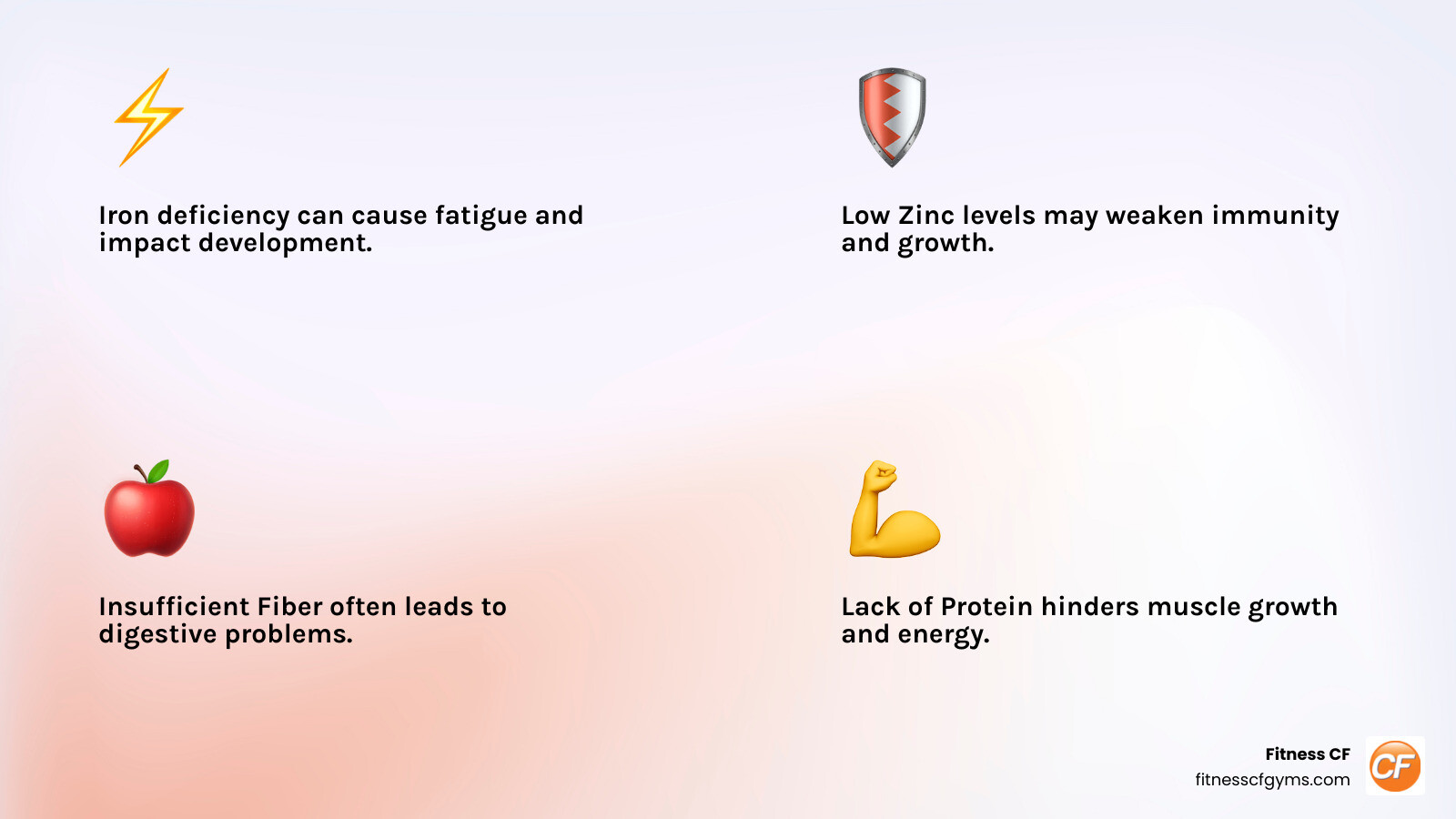Why Professional Help Can Transform Your Family’s Mealtime Struggles
A dietitian for picky eaters can provide expert guidance when your child’s selective eating becomes a source of daily stress and concern. Here’s what you need to know:
How a Dietitian Can Help:
- Assess nutritional gaps and deficiencies
- Create personalized feeding strategies without pressure
- Support healthy weight gain and growth
- Screen for serious conditions like ARFID
- Teach evidence-based mealtime approaches
- Address underlying medical causes
When to Seek Professional Help:
- Child eats fewer than 20 different foods
- Significant weight loss or poor growth
- Extreme anxiety around new foods
- Nutritional deficiencies affecting energy and development
If you’ve ever watched your child push away a plate of vegetables while you worry about their nutrition, you’re not alone. Research shows that picky eating affects approximately 30% of children and can lead to inadequate intake of essential nutrients like iron, zinc, vitamin D, fiber, and protein.
This selective eating pattern isn’t just a phase for many families. It can negatively impact social interactions, create mealtime battles, and leave parents questioning whether their child is getting the nutrition needed for healthy growth and an active lifestyle.
The good news? A registered dietitian nutritionist (RDN) specializes in changing these challenging feeding situations into positive experiences while ensuring your child gets the fuel they need to thrive.
I’m Pleasant Lewis, and after 40 years in the fitness industry, I’ve seen how proper nutrition forms the foundation for an active, healthy lifestyle. Understanding the role of a dietitian for picky eaters has become essential as I help families balance nutrition with fitness goals. Let’s explore how professional guidance can turn your mealtime struggles into success stories.

Understanding the Roots of Picky Eating
When your little one suddenly starts refusing their favorite foods or pushes away anything green on their plate, you might wonder what happened to your once-adventurous eater. The truth is, picky eating (also called selective eating) is incredibly common and usually emerges during the toddler years as children begin asserting their independence.

While often a normal developmental stage, picky eating can extend into school age and even adulthood, creating ongoing challenges for families. Understanding why it happens can help you approach mealtimes with more patience and effective strategies.
The developmental puzzle starts around age 1-2 when children’s growth rate naturally slows down. After their first birthday, toddlers simply don’t need as much food as they did during infancy, which can look like pickiness but is actually normal appetite regulation.
Around this same time, neophobia kicks in – the fear of new foods that peaks between ages 2-6. This might seem frustrating, but it’s actually a protective mechanism that helped our ancestors avoid dangerous foods. In modern times, though, it can make introducing new foods feel like an uphill battle.
Asserting independence becomes a major factor as children find they have control over what goes in their mouths. Refusing food can be a powerful way for a child to test boundaries and say “I’m the boss here!” This is especially common during the toddler years when independence is a key developmental goal.
For some children, sensory processing issues make certain foods genuinely overwhelming. The texture of mashed potatoes might feel slimy, the smell of fish could be overpowering, or the temperature of soup might be too intense for their sensitive system. These aren’t just preferences – they’re real sensory experiences that can trigger strong aversions to specific textures, smells, or tastes.
Parental influence plays a surprisingly significant role, often in ways we don’t expect. Well-meaning pressure to “just take one more bite” or bribes like “eat your vegetables and you can have dessert” can actually backfire. Research shows that parents who use more pressure or bribery often have children who become more selective about food, not less.
Sometimes picky eating signals underlying medical conditions that need attention. GI discomfort from issues like chronic constipation or reflux can make eating painful, leading children to avoid food altogether. When a child consistently refuses to eat or shows extreme reactions to food, it’s important to rule out physical causes.
Scientific research on pediatric feeding issues shows that poor weight gain can stem from various medical, environmental, or behavioral causes that require careful assessment by healthcare professionals.
The impact of persistent picky eating goes beyond just mealtime stress. It can affect social interactions, making family dinners or eating out with friends challenging. More importantly, it can lead to nutrient deficiencies in essential vitamins and minerals like iron, zinc, fiber, and protein.
These nutritional gaps can impact everything from energy levels and immune function to muscle development – all crucial for children who want to stay active and strong. When kids don’t get adequate nutrition, they may struggle with fatigue during play, sports, or other physical activities that are so important for healthy development.
This is where a dietitian for picky eaters becomes invaluable, helping families steer these complex feeding challenges while ensuring children get the nutrition they need to fuel their growing, active bodies.
The Comprehensive Role of a Dietitian for Picky Eaters
When picky eating becomes a source of daily battles and worry, a dietitian for picky eaters can truly transform your family’s relationship with food. These specialized professionals bring something invaluable to the table: a blend of clinical expertise, compassion, and practical strategies that work in real-world kitchens.
Every family’s story is different, which is why we start with a thorough, personalized assessment. Think of it as detective work – we’re piecing together the puzzle of your child’s eating patterns, preferences, and challenges.
We’ll dive deep into your child’s feeding history, from their earliest days to current habits. We look at developmental milestones and any medical conditions that might be playing a role. Often, we’ll ask families to keep a food journal for a week or two. This isn’t about judgment – it’s about understanding patterns, identifying nutritional gaps, and spotting opportunities for positive change.
One of the most important things a dietitian for picky eaters brings is the ability to create a safe, pressure-free environment around food. We shift the focus from “Did they eat enough?” to “Was mealtime peaceful and positive?” This simple change in perspective can reduce stress for the whole family and help children develop a healthier relationship with eating.
We understand that good nutrition fuels active, energetic lives. When children get the nutrients they need, they have the energy to run, play, learn, and grow. For older kids and teens, proper nutrition becomes even more crucial as they participate in sports and develop lifelong fitness habits. Just like adults need to understand what to eat before and after a workout, children need balanced nutrition to support their natural love of movement and play.
Why a Registered Dietitian Nutritionist (RDN) is Your Best Choice
When you’re looking for help with picky eating, credentials matter. While anyone can call themselves a “nutritionist,” only Registered Dietitian Nutritionists have the education, training, and legal authority to provide Medical Nutrition Therapy.
| Credential | Registered Dietitian Nutritionist (RDN) | Non-Certified Nutritionist |
|---|---|---|
| Education | Bachelor’s degree (minimum) in nutrition or related field from accredited program | No standardized education requirements |
| Training | 900+ hours supervised practice internship | No required clinical training |
| Certification | Must pass national registration exam | No standardized exam required |
| Continuing Education | Required ongoing education to maintain credentials | No requirements |
| Legal Scope | Licensed to provide Medical Nutrition Therapy | Cannot diagnose or treat medical conditions |
| Evidence-Based Practice | Required to use current research and best practices | No oversight of practice methods |
This training makes a huge difference when dealing with complex feeding issues. RDNs can identify when picky eating might signal underlying medical conditions, work with your pediatrician, and provide evidence-based interventions that actually work.
How a dietitian for picky eaters addresses nutritional needs
The magic happens when we move beyond just “getting kids to eat more” and focus on smart nutrition strategies. A skilled dietitian for picky eaters knows how to maximize nutrition even when food choices are limited.
Nutrient-dense strategies become our secret weapon. We help you identify foods that pack the biggest nutritional punch in small packages. Maybe that means adding a spoonful of nut butter to a smoothie your child already loves, or mixing finely chopped spinach into pasta sauce. Small changes can make a big impact on nutrition without overwhelming a sensitive eater.
Creative food preparation often opens doors that seemed permanently closed. Sometimes it’s as simple as serving carrots raw instead of cooked, or cutting sandwiches into fun shapes. We might explore different temperatures – some kids prefer room-temperature foods over hot meals. These small adjustments can make previously rejected foods suddenly acceptable.
When food alone isn’t enough, we provide guidance on supplements. This is especially important for nutrients like iron and protein, which are crucial for energy and muscle development. Iron deficiency can leave kids feeling tired and unfocused, while adequate protein supports the muscle growth that comes with active play and sports participation. We carefully evaluate when supplements are needed and ensure they’re used safely and effectively.
Understanding protein needs becomes particularly important for active children and teens who need fuel for their growing bodies and busy lifestyles.
For complex cases, functional nutrition testing can provide valuable insights. Micronutrient panels help us identify specific deficiencies that might be affecting mood, energy, or even sensory sensitivities around food. Sometimes digestive issues like chronic constipation make eating uncomfortable, leading to food avoidance. When we address these underlying problems, children often become more willing to try new foods.
When Picky Eating Signals a More Serious Condition like ARFID
While most picky eating is manageable, sometimes it crosses the line into Avoidant Restrictive Food Intake Disorder (ARFID). This isn’t just being choosy about vegetables – it’s a serious eating disorder that requires specialized care.
ARFID goes far beyond typical picky eating. We’re talking about significant weight loss or failure to grow normally, severe nutritional deficiencies that might require supplements or even medical intervention, and eating difficulties that seriously impact daily life and social activities.
Children with ARFID often have intense fear of certain foods or extreme reactions to textures, smells, or appearances. They might gag at the sight of certain foods or become genuinely distressed during mealtimes. This condition often appears alongside anxiety, ADHD, or autism, which can make feeding even more challenging.
When ARFID is suspected, a dietitian for picky eaters becomes part of a medical team that might include doctors, therapists, and other specialists. We work together to assess nutritional status, develop safe feeding plans, and help reduce anxiety around food. Our approach is always patient-centered and trauma-informed, respecting each child’s unique needs and sensitivities.
The goal isn’t to force change but to create safety around food and gradually expand options in a way that feels manageable. We also provide crucial support to parents, helping them understand the condition and learn effective, compassionate strategies for home.
This collaborative approach ensures that children with ARFID get the comprehensive care they need to develop a healthier relationship with food while maintaining proper nutrition for growth and active living.
Actionable Strategies for Peaceful Mealtimes and Active Lives
While working with a dietitian for picky eaters provides expert guidance, you can start making positive changes at home right away. The key is creating opportunities without pressure—think of yourself as offering invitations to try new foods rather than issuing demands.
The Division of Responsibility forms the foundation of peaceful mealtimes. This simple but powerful concept puts you in charge of what, when, and where food is served, while your child decides if and how much they eat. It sounds scary at first—what if they don’t eat anything?—but this approach actually helps children reconnect with their natural hunger and fullness signals.
Creating positive mealtime routines makes all the difference in your family’s eating experience. Turn off screens and put away toys so everyone can focus on the food and each other. When distractions disappear, children naturally become more aware of what they’re eating and may notice things about food they missed before.
Family meals offer one of the best teaching opportunities available. Children learn by watching, and when they see you enjoying a variety of foods, they become curious about trying them too. Even if your child eats something completely different from the rest of the family, sitting together creates connection and reduces mealtime battles.
Food exploration and play can transform how your child relates to new foods. Let them touch, smell, and interact with food without any expectation to eat it. This might look like sorting colorful vegetables by shape, making faces with different foods, or getting messy with cooked pasta. These playful interactions help reduce food anxiety and build familiarity.
Food bridging techniques work by connecting new foods to ones your child already accepts. If they love plain pasta, try adding a tiny sprinkle of parmesan cheese. Once that becomes familiar, you might introduce a small amount of butter, then perhaps some herbs. The key is making changes so gradual that they barely notice.
Getting children involved in meal preparation creates ownership and curiosity about food. Even toddlers can wash vegetables, tear lettuce, or stir ingredients. When children help make their meals, they often feel more willing to at least try what they’ve created. For busy families, efficient meal planning can make this involvement possible even on hectic weekdays.
Nutrition and Fitness: Meal Planning Tips for Busy Professionals
Connecting food to energy helps children understand why nutrition matters for their active lives. Instead of “eat your vegetables,” try “this broccoli helps build strong muscles for climbing at the playground” or “protein gives you energy to run fast with your friends.” When children understand how food fuels their bodies for fun activities, they often become more interested in eating well.
Parental self-care isn’t selfish—it’s essential for creating a calm mealtime environment. Dealing with picky eating day after day can leave you feeling frustrated and exhausted, emotions that children pick up on immediately. Regular physical activity, including both cardio and strength training, provides powerful stress relief and mood benefits.
Cardio exercise like walking, swimming, or dancing releases endorphins that naturally improve your mood and help you handle daily challenges with more patience. Strength training builds not just physical resilience but mental toughness too, giving you the energy and confidence to stay consistent with positive feeding approaches even when progress feels slow.
When you take care of your own physical and mental health through regular exercise, you show up as a calmer, more patient parent. This creates a ripple effect—less stressed parents lead to more relaxed mealtimes, which helps children feel safe to explore new foods at their own pace.
Changing eating habits takes time, often months or even years. The goal isn’t perfection but progress, one small step at a time toward a healthier, more peaceful relationship with food for your entire family.
Frequently Asked Questions about Picky Eaters and Nutrition
How many times should I offer a new food to a picky eater?
Here’s the truth that might surprise you: patience is absolutely everything when it comes to introducing new foods. Research shows it can take anywhere from 10 to 20 exposures before a child even decides if they like a new food. And we’re not talking about actually eating it – just accepting it on their plate without a meltdown!
The key is offering new foods consistently without any pressure. Think of yourself as a friendly food ambassador, not a food enforcer. Always include a “safe food” – something you know they’ll eat – alongside the new item. This takes the pressure off and ensures they won’t go hungry.
Model eating the food yourself and talk about its characteristics. “Look how orange this carrot is!” or “Listen to how crunchy this apple sounds!” Keep portions of new foods tiny – we’re talking a single pea or a sliver of carrot. The goal is exposure and familiarity first, consumption later.
Every exposure counts, even if they just look at it, touch it, or smell it. You’re building their food vocabulary one small step at a time.
Is it okay to “hide” vegetables in my child’s food?
This question comes up in almost every consultation, and honestly, the answer isn’t black and white. Hiding vegetables can be a helpful temporary tool for boosting nutrient intake, especially if your child has significant nutritional gaps. Blending spinach into a smoothie or finely grating zucchini into meatballs can definitely increase their vitamin and mineral intake.
But here’s the important part: this shouldn’t replace openly offering whole foods. If children only eat vegetables when they’re hidden, they never learn to recognize, appreciate, or choose those foods on their own. They miss out on learning that “hey, I actually like the taste of sweet carrots” or “broccoli is kind of fun to eat.”
A dietitian for picky eaters can help you find the right balance. We might suggest using hidden vegetables as a nutritional safety net while you work on the bigger picture of food acceptance. Think of it as one tool in your toolkit, not your only strategy.
The goal is always to move toward open acceptance of foods, where your child can make informed choices about what nourishes their body for all their active adventures.
How can a dietitian for picky eaters help an adult?
Here’s something many people don’t realize: picky eating doesn’t always disappear with age. Adult picky eating is more common than you might think, and it can seriously impact quality of life. Social dinners become stressful, dating gets complicated, and nutritional deficiencies can leave you feeling tired and rundown.
A dietitian for picky eaters can provide life-changing support for adults by unpacking the history of eating habits. We help you understand where your food fears or aversions came from – maybe it was pressure at childhood dinner tables, or a bad experience with a certain texture.
We’re also experts at addressing nutritional deficiencies that may be impacting your energy levels and overall health. Many adult picky eaters are missing key nutrients that support an active lifestyle. We identify these gaps and develop realistic strategies to fill them, often by enhancing foods you already enjoy.
Expanding your diet systematically is another crucial area where we help. Using gentle, science-based techniques, we can gradually introduce new foods while respecting your comfort zone. This isn’t about forcing yourself to eat everything – it’s about building confidence and choice.
For adults committed to fitness and healthy living, proper nutrition becomes even more important. Your body needs adequate protein for muscle recovery after strength training, complex carbohydrates for sustained energy during cardio workouts, and a variety of vitamins and minerals to support overall wellness.
We also help with managing social anxiety around food. Learning strategies to steer restaurant dinners, work lunches, and social gatherings can dramatically improve your quality of life.
The beautiful truth is that it’s never too late to address picky eating. The benefits extend far beyond just nutrition – you’ll gain confidence, reduce stress, and open up a whole world of culinary experiences that support your health and fitness goals.
A Holistic Path to Healthier Eating and Living
Picky eating touches every corner of family life, creating stress that extends far beyond the dinner table. Whether you’re watching your toddler push away vegetables for the hundredth time or you’re an adult avoiding social dinners because of food anxiety, these challenges affect relationships, confidence, and overall well-being.
The journey we’ve explored together shows that picky eating is absolutely manageable when you have the right support and strategies. It’s not about forcing change overnight or winning battles at mealtime. Instead, it’s about understanding the deeper reasons behind selective eating and building positive experiences around food.
A registered dietitian nutritionist becomes your family’s nutrition champion. We bring years of specialized training, evidence-based approaches, and most importantly, compassion to your unique situation. Our goal isn’t just to expand food choices—it’s to help your family develop a healthy, joyful relationship with eating that lasts a lifetime.
When we address nutritional gaps and reduce mealtime stress, something beautiful happens. Children have more energy to play, explore, and grow. Adults feel confident trying new foods and joining social gatherings. Families reconnect over meals instead of fighting through them.
True wellness means nourishing both your body and your strength. Just as good nutrition provides the fuel your body needs, regular physical activity builds the engine that uses that fuel effectively. The benefits of cardio—improved heart health, better mood, and increased energy—work hand in hand with proper nutrition to create vitality. Meanwhile, strength training builds the muscle mass that helps your body use nutrients efficiently while boosting metabolism and bone health.
This connection becomes especially important for families dealing with picky eating. When children see food as fuel for their favorite activities—whether it’s running around the playground or keeping up in sports—they start understanding nutrition differently. Food becomes something that helps them do what they love rather than something they have to endure.
For parents managing picky eating challenges, staying physically active provides crucial stress relief and mental clarity. The benefits of strength training extend beyond physical improvements to include better sleep, reduced anxiety, and increased resilience—all essential when navigating feeding difficulties with patience and consistency.
At Fitness CF, we understand that your family’s health journey encompasses both what you eat and how you move. While we focus on empowering you with fitness tools and creating an environment where everyone can thrive physically, we recognize that nutrition forms the foundation of everything else you want to achieve.
When you overcome picky eating challenges with professional support, you open up more than just better nutrition. You gain energy for workouts, enthusiasm for active family time, and the confidence that comes from taking control of your health. Your whole family benefits when mealtimes become peaceful and bodies become strong.
Ready to complement your nutritional progress with movement that energizes your entire family? We’re here to support every aspect of your wellness journey, creating a place where healthy habits flourish naturally.
Take the next step in your family’s wellness journey with personalized training









